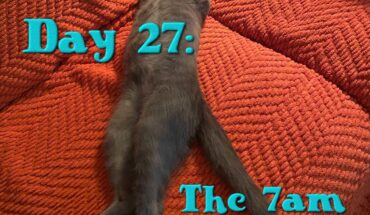 As I got older, I thought life would get simpler. I’d go to work. I’d come home. I’d read away the hours. In my thirties, I discovered writing (well, rediscovered it after a particularly unhelpful, James Joyce-loving professor told me I couldn’t “paragraph” correctly), and I spent some of that free time working on a novel. Then I got a husband. Then I started to cook. Then I got a house and a dog, then another. I acquired a couple of cats along the way as well, but God bless them, they are so undemanding. Needless to say, my reading time is significantly less than I had thought it would be at this point in my life.
As I got older, I thought life would get simpler. I’d go to work. I’d come home. I’d read away the hours. In my thirties, I discovered writing (well, rediscovered it after a particularly unhelpful, James Joyce-loving professor told me I couldn’t “paragraph” correctly), and I spent some of that free time working on a novel. Then I got a husband. Then I started to cook. Then I got a house and a dog, then another. I acquired a couple of cats along the way as well, but God bless them, they are so undemanding. Needless to say, my reading time is significantly less than I had thought it would be at this point in my life.
Of course, things snowballed. Instead of just wanting to work on a novel, I also want to work on a series of essays. Instead of just walking the dogs and taking them to the park, I decided to take them to classes, many classes, both physical and online. My younger dog has reactivity issues, which requires a lot of time and management. I have a list of house repair projects that need done. I’ll be out of work in ninety days and need to figure out what to do for money. As my life went, my novel went, so now it had too many points of view, too many characters, too many settings, and too many threads. Stuff piled on stuff piled on stuff. It was keeping me up at night.
My dog was out of control. My novel was out of control. My house and budget were a mess. I had to simplify. I was getting nothing done because I couldn’t live up to my own expectations, nor could my novel. I took a breath and figured out what was most important to me. I would work primarily on those things and declare victory if I succeeded. It was a simple, but not necessarily simple to do, list: (1) finish my novel, (2) get Zephyr’s reactivity under control, and (3) figure out how to get paid without going back to a corporate environment {shudder}.
First and foremost, I wanted to finish my book in a timely manner (under ten years would be nice). I started to realize that I tended to solve problems in my novel by throwing more characters, plot lines, and settings into the mix, which is the opposite of what I should be doing. I have now decided to pare my story down to one point of view, get rid of some characters I like, reduce the number of settings, and lose threads that don’t hold up the spine of the book.
By removing points of view, I don’t have to worry about each POV character’s signature, desires, point of attack, etc., how they intersect with each other, and what their individual arcs mean to the overall story. One of my POV characters has always been the lead in the story so it was easy to figure out who should be narrating. By focusing on one point of view, I’ve finally been able to see the main path through my story.
By removing characters, I have less to keep track of, as does the reader. I don’t have to worry about each character’s shift. I don’t need to worry about what they look like, their habits, or how they are connected to the protagonist. I’ve already been able to combine plot points or key events played by two characters into one character, giving that one character more meaning and a richer life.
By removing settings, I can concentrate on bringing those settings to life by adding more and more details. With fewer settings, the reader can get to know intimately the world I’ve created, instead of scrambling to figure out where exactly she is in the story.
By removing threads, I can fully develop the ones I keep. I’ve been able to see for the first time, the importance, or not, of a particular scene. I can ask if a particular thread in any way leads to the protagonist solving her problem. This simplifying has already helped. For the first time ever, I’ve been able to do some sort of “outline” for my novel, which has proven to be eye opening in many respects. I think the simplification of my story allowed me to actually think through the story and construct a path to the end. I was able to focus on one thing at a time versus trying to incorporate many things. I could see one path.
It felt good, this paring down. Onto number two, which was by far the most painful. The classes I take the dogs to keep me sane as I wrote about previously in these pages. But, if I work on simple things — Zephyr’s focus and his impulse control, which could be done at home—it would go a long way in getting his behavior issues under control.
I’m hoping by getting Zephyr under control, I will have more time to write, which will help with item number one and item number two. As for item number three, well, that’s a hard one to simplify. It’s a complicated thing trying to switch careers in your forties and wanting to do things that don’t pay so well. But I am starting to formulate a plan, a singular plan, which may or may not work out. I’ll try to keep it simple.



4 comments